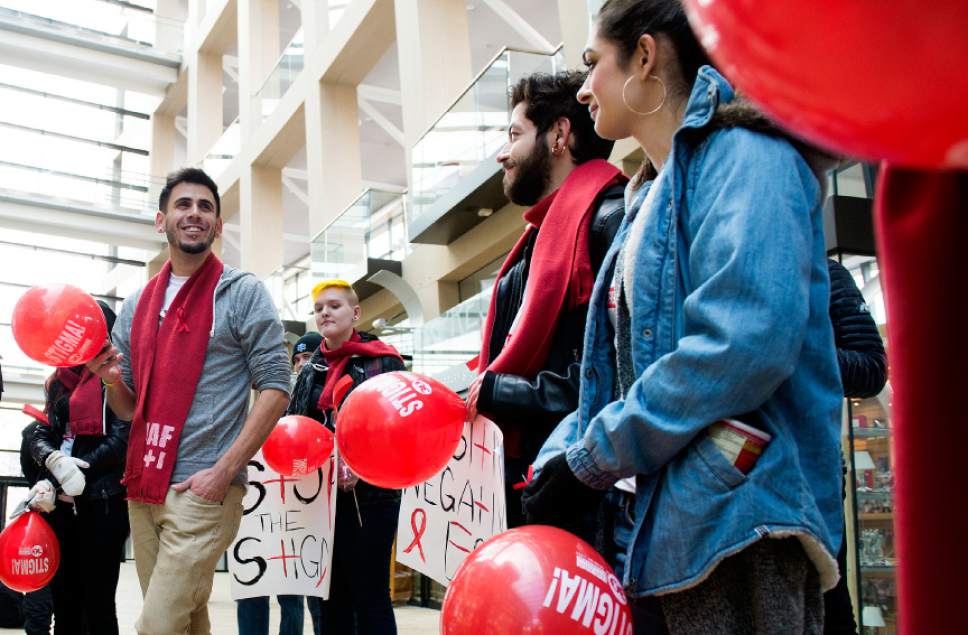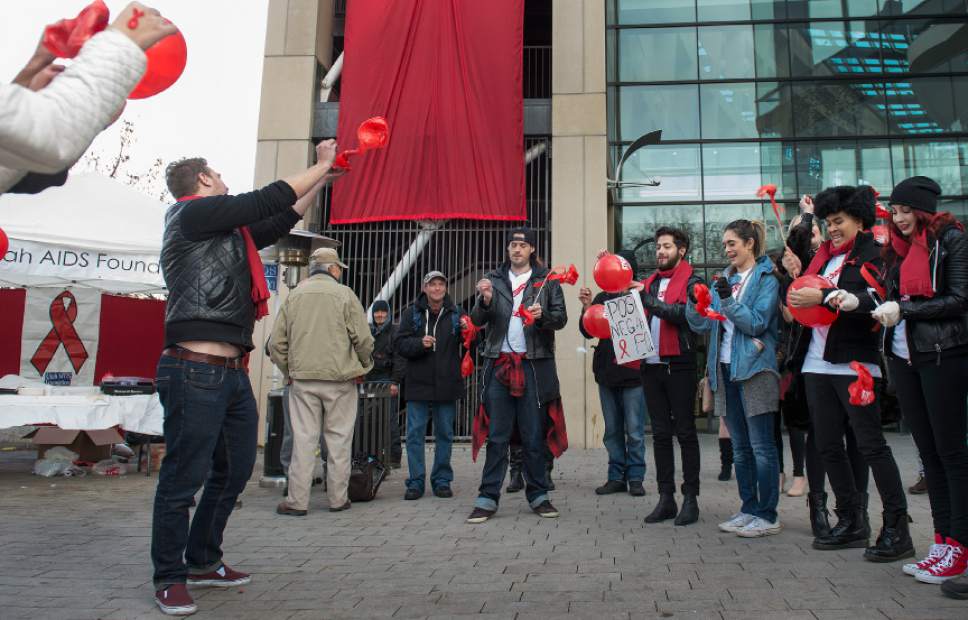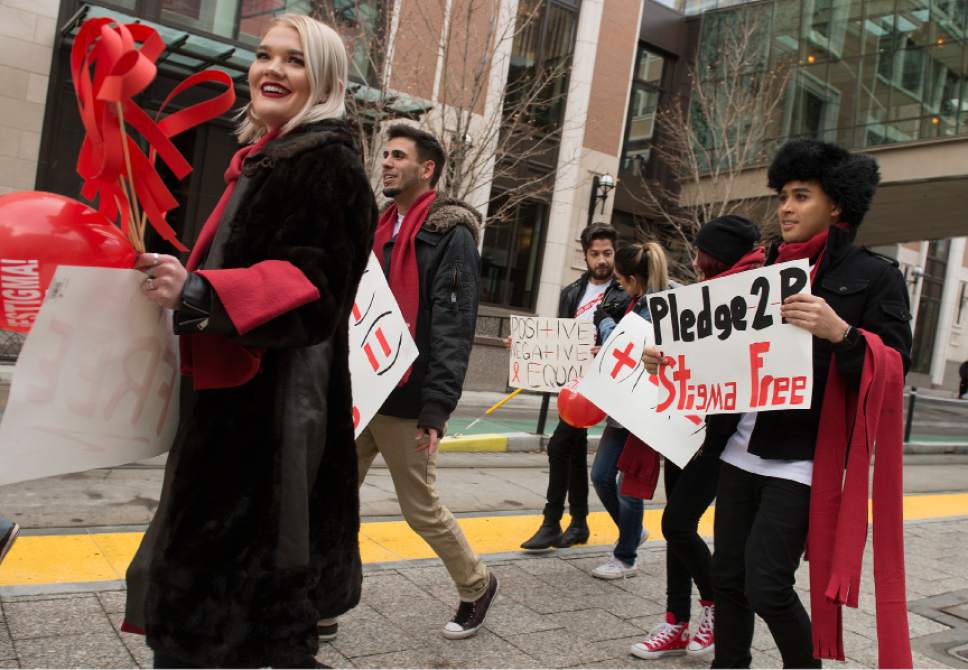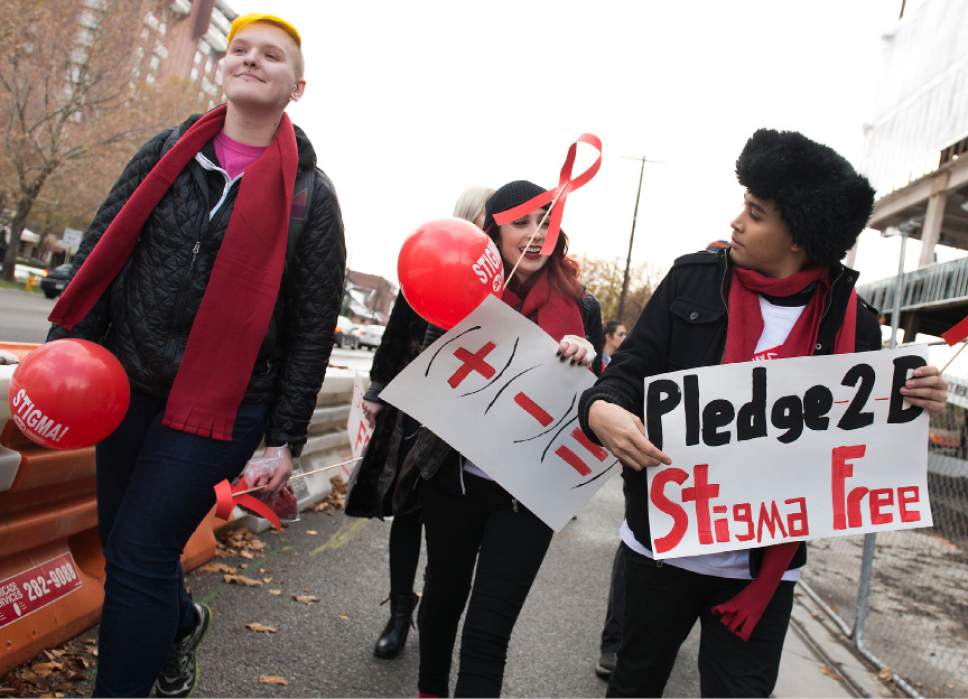This is an archived article that was published on sltrib.com in 2016, and information in the article may be outdated. It is provided only for personal research purposes and may not be reprinted.
When Michael Weight was diagnosed with HIV in 2005, he panicked.
"I didn't know what to think," the 55-year-old Salt Lake City man said. "I didn't really know anybody that had it … I didn't want anybody to know."
He also didn't know where to turn for help and said he "coped" by diving deep into drug use, the very thing that had caused him to contract the disease.
"I wasn't educated," said Weight, a former hairdresser who can no longer work because of the illness.
These days, Weight takes a three-pill cocktail of drugs to help keep his disease in check, and he volunteers at the Utah AIDS Foundation, where he hands out food, sympathy and support to others living with HIV/AIDS.
Since 1988, Dec. 1 has been designated as World AIDS Day to raise awareness of the disease that health officials say has claimed more than 36 million lives worldwide.
Utah marked the day with events across the state, including free HIV screening tests, educational programs, films and an awareness march through downtown Salt Lake City. At dusk, Salt Lake's City Hall was illuminated in red lights as a reminder of those whose lives have been impacted with HIV/AIDS.
"Many of us have lost family members and friends or know people who are living with HIV/AIDS," Salt Lake City Mayor Jackie Biskupski said in a statement. "As a community, we must work to eliminate the stigma that still exists against people living with HIV, and to support education, prevention, treatment and the work toward a cure."
Part of eliminating the stigma, said Benjamin Holdaway, HIV prevention coordinator for the Utah AIDS Foundation, is making clear to the public how the virus is spread: exposure to some bodily fluids, sexual behavior and needle or syringe use, but not through kissing. To demonstrate that, about 15 people held a "kiss-in" on TRAX downtown Thursday afternoon. Participants kissed each other at two trains stops while holding "stop the stigma" posters.
"It's about showing affection, not anger," Holdaway said, wearing red lipstick and calling the demonstration a "sexy rally."
The group passed around a container of mints before locking lips. They also handed out red scarves to passersby to spread awareness about HIV/AIDS.
Frank Castro contracted HIV at age 18 when, he says, "the idea of contracting anything more than a cold never occurred to me."
Now 30, Castro said the hardest part of his diagnosis is combating misconceptions; he has had several people on dating apps call him "infected, dirty, unclean and a walking disease" because of the virus.
But what they don't understand, Castro said, is that he takes one pill a day to "suppress" the virus, meaning he can't actually spread it.
"What used to be a death sentence is now treatable," he added. "The reason I'm no longer a threat is because I'm medicated."
Others, including Lucas Horns, believe the solution is to stop treating HIV with a "hush-hush, don't-talk-about mentality." Horns wants people to be accepted when they speak openly about the virus.
"Of course it's a disease you don't want, but you don't want to be shamed for having it," he said.
The group marched from Main Street to the City Library, where outside they popped red balloons with pins to symbolically "stick it stigma."
HIV stands for human immunodeficiency virus, which attacks the body's immune system, leaving it vulnerable to opportunistic infections and some cancers. The disease disproportionately affects men who have sex with other men.
The final stage of HIV is AIDS, or acquired immune deficiency syndrome.
About 2,565 Utahns are living with HIV, according to state health department data from 2013, the last available year. That is only a fraction of the 1.2 Americans who have the disease nationwide, but there is still cause for concern, health advocates and officials say.
Utah has a low annual rate of new diagnosed infections — 120 in 2014 — but also has a low rate of testing, so many people may have the disease, but just don't know it.
"The information we have is that only 25 percent of adults in Utah have had an HIV test," said Benjamin Holdaway, HIV prevention coordinator for the Utah AIDS Foundation. "The fact they are not getting tested is just ridiculous."
One challenge, said Erin Fratto, the state health department's communicable disease coordinator, is Utah's conservative culture, which can sometimes be a barrier to conversations about sex and sexual health.
World AIDS Day Events:
12th Annual Red Party
Utah AIDS Foundation
The Rest at Bodega
331 S. Main St., Salt Lake City - 6:00 p.m.
Lectures Series - Salt Lake City Public Library
HIV cure research and PrEP HIV prevention - 11:00 a.m.
Beyond ART: Strategies to Cure HIV - 12:00 p.m.
Film Screenings/Events - Salt Lake City Public Library
Sing Along: "RENT" Sing Along - 3:00 p.m.
Film: "Blood Brother" 6:00 p.m.
Film: "Remembering the Man" 8:30 p.m.
Salt Lake City AIDS Awareness March
City Center TRAX Station - 1:30 p.m.
Weber State University - Student Union
Panel discussion - 10:30 a.m. -11:45 p.m.
Film Screening: "The Normal Heart" - 2:30 p.m.
Followed by film discussion and reception
Free HIV Testing:
Utah County
Centro Hispano, 817 S. Freedom Blvd., Provo
2:00 p.m. to 6:00 p.m.
Utah County Health Department
151 University Ave., Provo
By appointment
http://www.utahcountyonline.org/Dept2/ Health/Index.asp
Salt Lake County:
Salt Lake Public Library
210 E. 400 South, Salt Lake City,
9:00 a.m. - 6:00 p.m.
Sponsored by Utah AIDS Foundation
Weber County
Weber State University
848 Harrison Blvd., Ogden,
Student Union
9:00 a.m - 2:00 p.m.
Sponsored by Weber-Morgan Health Department
Iron County: Dec. 5
Southern Utah University
Student Center
351 W. University Blvd., Cedar City
9:30 a.m. - 2:00 p.m.
Sponsored by Centro Hispano









